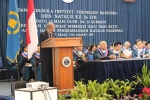The Rector of ITB Conveys Autonomy as Strengthening the Academic Mission of Higher Education on the 65th Anniversary

BANDUNG, itb.ac.id — Rector of Institut Teknologi Bandung (ITB), Prof. Reini Wirahadikusumah, Ph.D., delivered a speech with the topic "Autonomy: Strengthening the Academic Mission of Higher Education" at the Open Session of ITB's 65th Anniversary in the West Hall, ITB Ganesha Campus, on Monday (4/3/2024).
Prof. Reini revealed that one of the significant concerns in the education sector is the autonomy of higher education. With the government issuing regulations governing the transformation of State Universities (PTN) into autonomous universities with State-Owned Legal Entity (PT BHMN) status, academic circles have indeed welcomed this new initiative.
"In response to these regulations, we academicians are very pleased because they provide broader scope for universities to enhance higher education services and contribute even better to the nation's progress," she stated.
However, as this policy progressed, she considered that this regulation created new issues, particularly regarding financial autonomy, which divided academic circles into two parties. On one hand, the first party believes that the autonomous status of the state gives universities a new mission to enhance academic performance, thus necessitating increased funding support from the state.
"However, the second party believes that with the autonomous status granted by the state, universities can actually enjoy more freedom in acquiring funding from the public, thereby potentially reducing financial support from the state. This support can be obtained through the commercialization of research results, which could ultimately enhance financial independence for universities,” she said.
In response to these two perspectives, Prof. Reini stated that in reality, the commercialization of research results cannot serve as the primary source of funding for universities in delivering higher education services. This is due to the fact that the commercialization process heavily relies on elements within the national innovation ecosystem, including factors like the state of healthy business competition, connectivity among economic sectors, and inter-institutional support, along with regulatory frameworks.
Furthermore, this sector is incapable of directly benefiting campuses because economic value is generated through market activities among market players. However, since universities do not function as market players, market relationships between universities and companies cannot be established."
In fact, universities are institutions of knowledge and culture tasked with advancing civilization. Therefore, higher education services and research results cannot be simply reduced to 'private goods. Hence, the notion that autonomous universities can attain financial independence is unrealistic," she added.
Prof. Reini emphasized that the state's role in contributing through investment in financing higher education and research is both strategic and crucial.
"This is not an easy thing, but this policy can be pursued if the state can strengthen the national innovation economy and not consider universities as isolated systems. I believe that we will be able to make continuous improvements so that with autonomous status, ITB can further improve its academic performance, which is increasingly relevant to the nation's development needs," she said.
Reporter: Nur Rama Adamas (Civil Engineering, 2020)
Translator: Hanifa Juliana (Urban and Regional Planning, 2020)
Editor: Kezia Hosana

scan for download






